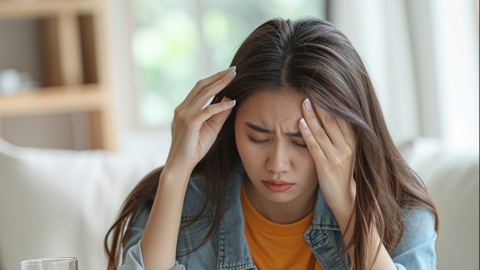What causes headaches during menstruation?
Generally, "Yima" refers to menstruation. Headaches during menstruation may be related to hormonal changes, emotional fluctuations, insufficient qi and blood, colds, migraines, and other factors. If experiencing discomfort, it is recommended to seek medical attention promptly and receive treatment under the guidance of a qualified physician. Detailed explanations are as follows:

1. Hormonal Changes
During menstruation, estrogen levels in women decline, which may cause vasoconstriction and affect blood supply to the brain, leading to headaches. It is recommended to engage in mild physical activities such as walking or yoga to promote blood circulation.
2. Emotional Fluctuations
During menstruation, women may experience significant emotional changes, such as tension or anxiety, which can stimulate the sympathetic nervous system, cause dilation of head blood vessels, and result in headaches. At this time, techniques such as meditation or deep breathing can help relax the body and mind.
3. Insufficient Qi and Blood
During menstruation, women lose some blood. If a woman already has a deficiency in qi and blood, the blood supply to the head may become even more inadequate, causing headaches. Nutritional supplements such as red dates, goji berries, longan, lean meats, and other nourishing foods can be consumed in moderation.
4. Common Cold
A cold is caused by a viral infection of the upper respiratory tract. During menstruation, a woman's body is relatively weak and more susceptible to viral invasion, which may cause cerebral vasoconstriction and result in headaches. Symptoms often include nasal congestion, sneezing, and runny nose. Treatment may include medications such as Lanqin Oral Liquid, Compound Paracetamol and Amantadine Capsules, or Shuanghuanglian Oral Liquid, as directed by a physician.
5. Migraine
Migraines may be caused by disorders of nerve cell excitability, endocrine factors, and metabolic changes. Women may experience migraine attacks during menstruation. Symptoms typically include nausea, vomiting, and sensitivity to light. Under a doctor's guidance, medications such as ibuprofen sustained-release capsules, flunarizine hydrochloride capsules, or Tianma Toutong Pian can be used for treatment.
Maintaining healthy lifestyle habits and increasing nutrient intake, particularly foods rich in iron and vitamins such as red meat, leafy vegetables, and legumes, are important for maintaining overall health.






